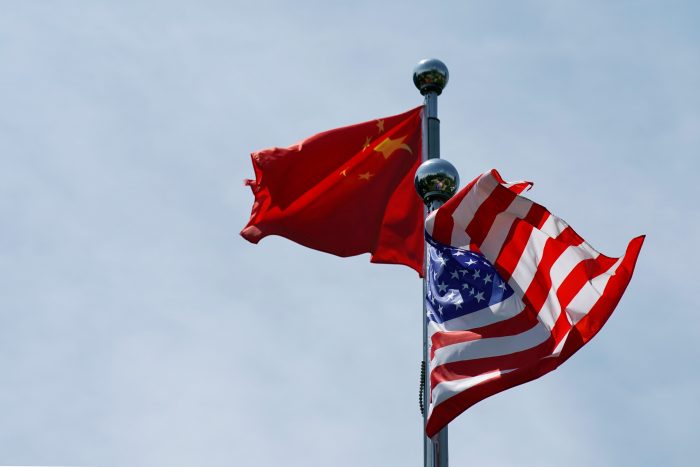Beijing has warned that it must not be a bargaining chip in deals that countries sign with the United States to avoid tariffs being imposed by the Trump Administration.
China’s Ministry of Commerce issued a statement on the weekend saying it firmly opposed any party signing tariff deals at China’s expense.
“Should such a situation arise, China would never accept it and would take firm, resolute counter-measures to defend its legitimate rights and interests, the ministry said.
ALSO SEE: Trade Deal Signed, But China Still Slow to Release Rare Earths
Beijing has condemned “reciprocal tariffs” imposed by US President Donald Trump as an act of “unilateral bullying” and urged countries seeking to sign trade deals with the US to take the high moral ground by avoiding imposing punitive duties in an effort to safeguard their interests.
“China welcomes all parties to resolve trade disputes with the US through equal consultations. We call on them to be on the side of fairness and justice and vigorously uphold multilateral international trade rules,” it said.
US officials have been negotiating framework trade agreements with multiple countries in Asia and other parts of the world.
Flurry of trade deals pending
An initial limited agreement has already been reached by the US and Britain, while a preliminary deal with China was also signed last week, following talks in Geneva and London over the past six weeks.
India, Japan, Vietnam, South Korea, Thailand, Australia and the European Union are among the countries and trading partners that have been seeking to reach trade agreements with Washington.
Many have moved swiftly to get broad agreements signed before July 9, which was the initial date that Trump said a 90-day pause of the tariffs would end.
The US President has since made comments suggesting that date could be extended, saying late last week that he might not stick to the deadline when tariffs are set to take effect again.
“We can do whatever we want,” he remarked to reporters at the White House on Friday.
US Commerce Secretary Howard Lutnick remarked that the US president also said he would ultimately send “letters” to countries dictating trade terms if agreements aren’t reached in time.
“China welcomes all parties to resolve economic and trade differences with the US through equal consultations. At the same time, China calls on all parties to stand on the side of fairness, justice and historical correctness, firmly upholding international economic and trade rules and the multilateral trading system,” the ministry’s statement said.
The Global Times, one of Beijing’s state media outlets, said on Sunday: “China consistently upholds the principle of addressing economic and trade issues between countries within a multilateral framework, which includes adopting an equal and mutually beneficial approach toward all nations.
“Therefore, if certain countries fail to adhere to multilateral principles in trade negotiations, causing losses to China, the Chinese side will certainly not endorse such practices,” Zhou Mi, a senior researcher at the Chinese Academy of International Trade and Economic Cooperation, told the paper on Sunday.
Beijing ‘aware of Trump’s erratic nature’
An academic from the Institute of Public Policy at the South China University of Technology in Guangzhou, Xu Weijun, told the South China Morning Post (SCMP) that even though China and the US appeared to be progressing towards a framework deal on trade, Beijing was “keenly aware of Trump’s erratic nature” and that he had a “history of flip-flopping.”
“As the US also sits down with other countries for crunch talks on separate, one-on-one occasions that Beijing may not be able to track, Beijing feels the need to remind them that China must not be victimised,” Xu was quoted as saying.
The SCMP noted on Monday that officials from the Commerce Ministry had confirmed that they would “review and approve” export applications for controlled items and that the US would correspondingly remove some of its limits.
Those remarks are thought to refer to tension over China’s slow release of rare earth exports and retaliatory measures imposed by Washington until the two sides sorted out their differences at a second round of talks in London earlier this month.
“This development is a sign of much-needed progress in trade talks between the two superpowers, with the focus shifting from tariffs to the two countries’ extensive reciprocal export controls,” the SCMP said.
“Beijing and Washington have been in close communication since a two-day round of trade talks in London wrapped up earlier this month, with both sides further confirming details of the framework agreed upon.
“We hope that the US side will work with China, in line with the important consensus and requirements put forward during the June 5 phone call between the two presidents,” the ministry’s statement said.
- Jim Pollard
ALSO SEE:
Ford Still Not Getting Enough Rare Earth Magnets From China — WSJ
Carmakers Stressed by China’s Curbs on Critical Mineral Exports
China Export Curbs on Rare Earth Magnets: a Trade War Weapon
China Sets up Tracking System to Trace Its Rare Earth Magnets
Trade Truce Done With 55% Tariffs on China Exports, Trump Says
China Denies Trump Claim, Says It Was US That Broke Trade Deal
China ‘Totally Violated’ Tariffs Agreement With US, Trump Says
Trump’s Tariffs Reinstated as Appeals Court Pauses Trade Ruling
Shipments of US Ethane to China Face Export Licence Uncertainty
US Blocks Chip Design Software, Chemical Shipments to China
Beijing Says Latest US Chip Warning Puts Trade Truce at Risk
























